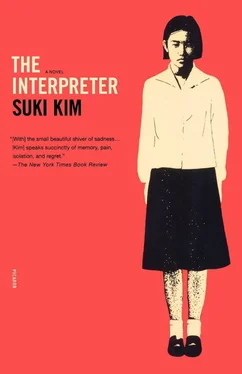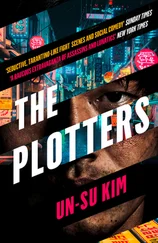Suzy pauses, turning to face him.
“Has Grace been here too?”
“Yes, several years ago, a few months before your parents’ deaths maybe. She wasn’t like you, though.”
“What do you mean?”
“She had only one question.” He smiles faintly, his hand around the doorknob. “She asked where my wife was buried. Montauk, I told her.”
IT IS AFTER FOUR O’CLOCK when Suzy finds herself sitting on a bench at Bryant Park, on 42nd Street. The wind is cold against her skin, crisp, refreshing. Darkness sneaks in with a tinge of green, the way it does when autumn turns to winter overnight. The trees are drained of color. Suzy prefers the parks in winter. Their bareness comforts her.
It’s been a long day, from the morning bus ride to New Jersey to the trip to Queens. She would have been happy to go straight home. But while waiting for the R train at Rego Park Station, she noticed Mr. Lim on the opposite platform, their next-door neighbor when they lived in Flushing many years ago. He and his wife had shown up at her parents’ funeral, which surprised Suzy because she vaguely recalled a sort of falling-out between him and Dad. He did not exactly acknowledge her then. He seemed aware of the circumstances in which she had shamed her parents. Korean elders never look kindly at daughters whose filial piety is in question. His wife tried to meet her eyes a few times, but Suzy pretended not to notice, not feeling up to polite greetings.
Mr. Lim had also been a truck deliveryman. During his early years of delivery work, Dad used to call him for tips. The selection of fruits and vegetables depends on the neighborhood. Harlem stores needed more bananas than others. The ones in the Hispanic neighborhoods couldn’t do without yucca roots and plantains. And the Manhattan stores, the Upper East Side especially, carried the most expensive fruits, like mangoes and raspberries and papayas. The trick is to figure out which wholesalers carry the best grapes, and which ones to avoid for melons. It was Mr. Lim who showed Dad where to go for half-priced bananas on Friday mornings, and whom to enlist for extra help during Thanksgiving seasons. But then, at some point, Mr. Lim bought a store on Lexington Avenue. Manhattan, Dad exclaimed, where rents are steep and employees cost a fortune! After visiting his store, Dad couldn’t stop talking about his impeccable salad bar. From grape leaves to California rolls to vegetable tempura to kimchi , imagine charging as much as $4.99 per pound! Whoever knew Americans would develop such continental taste buds? You’d think they had never lived without salmon maki or chicken tandoori! Koreans are responsible for that, you know, the craze over world cuisine at your fingertips, it all started with our salad bars! But then, soon afterward, Dad stopped calling Mr. Lim. In fact, the mere mention of his name made Dad twitch in anger. Something to do with money. Dad needed a loan, and Mr. Lim seemed to have refused.
Suzy was about to wave at him across the track when she noticed something strange. A group of boys and girls were straggling around him, as though a nearby school had just let out for the day. Amidst the giddy teenagers in oversized parkas and baggy jeans, he cut a lonely figure, huddled in a dark overcoat, facing the black tunnel from which a train might come hurtling any minute. He hadn’t seen her yet, or if he had, he was pretending not to have. She had been only nine or ten when she last saw him in Flushing, and at the funeral she barely paid him any attention. But now, in the dimness of the underground, she noticed something oddly familiar about the way he stood with his head cocked to one side, about thirty degrees to his right. What was he doing here anyway, on a subway platform in the middle of the day? Why wasn’t he at work? Has he moved to this part of Queens now? At that very moment, the R train flew down the track with a roar, landing at her feet. She jumped in automatically, quickly turning to the window to find him still on the other platform. She thought she saw him turn to stare directly at her as the train gained speed. And it was not until a few stops later—between Elmhurst and Jackson Heights, where the train got stuck for fifteen minutes—that it dawned on her that Mr. Lim’s peculiar posture had reminded her of the man who’d stood by the Montauk lighthouse in the rain.
Montauk, I told her.
Kim Yong Su’s last words, circling in her head. What could it mean? A few months before their death… did her parents send Grace there?,
Montauk.
Where her parents’ ashes are scattered.
Where Kim Yong Su’s wife is buried.
Where Suzy two days ago walked to its lighthouse, where a strange man had stood watching, a man resembling Mr. Lim, the next-door neighbor from her childhood.
Where Grace had shown up last Friday to rent a boat. Kelly’s boat, over at the dock. A tiny sloop. Two-person, max. And Grace can’t even swim. And the secret wedding. Somehow Suzy is not convinced. Just a gut feeling. No evidence to the contrary, no reason to disbelieve…
“Sorry, have you been waiting long? What a dreary day!”
Jen stands before Suzy, carrying a brown paper bag in her arms. She’s gotten older, Suzy notices for the first time, but in just the right way. Her blond hair is pulled back in a simple ponytail; the light-mauve lipstick complements her creamy glow. Looking at Jen bundled in a knee-length camel coat, Suzy can see a woman reaching her prime in her thirties. Jen has never looked more radiant, Suzy thinks. So confident, so knowing, so perfectly compassionate. The same does not apply to Suzy herself, of course. Linear age eludes her. With her parents’ sudden death, Suzy skipped her youth entirely.
“Thank God, I was worried you might’ve gotten us coffee too.” Jen slides by Suzy’s side and takes out two large cups from the bag. “Decaf. I didn’t think you’d want the caffeine kick so late in the day.”
Suzy recalls how they had both been such fervent coffeedrinkers in college. They spent most of their junior year huddled in the dark corner of the Hungarian Pastry Shop, sipping double espresso while writing their Eighteenth-Century Novel papers. They were both literature majors. Back then, they would have sniffed at the mention of decaf, as though caffeine were the sign of a true soul. And now nothing is that absolute, nothing evokes such a conviction. Must be the years. Comforting to know that they are gaining in years together.
“Soooo nice to be outside!” Jen takes a deep breath, handing Suzy one of the paper cups. “I didn’t know that I’d end up wasting all of my twenties in a cubicle.”
Earlier, when Suzy called from the subway station, Jen sounded flustered, even slightly panicked. Meet you at the park in twenty minutes; any excuse to leave the office for a bit, Jen groaned. The writer for the cover story was a total control freak, which explained the painful late hours this week. But that could not be the reason for her panic, Suzy thought, detecting a slight tremor in Jen’s voice, which suggested trouble.
“You love it. You’ll say the same thing when you turn forty,” predicts Suzy, taking the hot cup with both hands. The heat is nice. Half the fun of hot coffee is holding the mug.
“Maybe not…” Jen looks away at the pair of musty pigeons tottering along the green patch nearby. “So how was your day?”
Suzy can tell that something is wrong. Jen always defers the subject to another when something is bothering her.
“I went to see Grace today.” Suzy does not elaborate. It is obvious that Jen has a load on her mind.
“And did you see her?” Jen looks surprised, and intrigued. She has never met Grace, but she has never approved of Grace’s hostility toward Suzy.
Читать дальше












